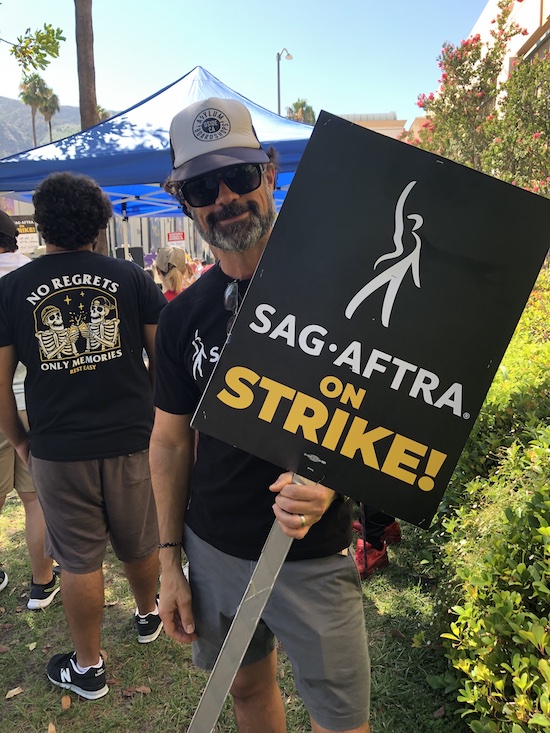Danny Pino Explains the Importance of Residuals for the Striking Actors and Writers
August 25, 2023 by Marisa Roffman

Danny Pino on the picket line at Warner Bros. (Photo credit: Marisa Roffman/Give Me My Remote)
As the WGA and SAG-AFTRA strikes continue on, Danny Pino has been a regular presence on the picket lines around Los Angeles. “I’m here in solidarity, not only with the WGA, SAG-AFTRA, with IATSE, and our brother and sister unions to seek a fair deal,” he explains to Give Me My Remote in the video below. “And to be able to have some longevity, not only for artists and laborers, but for our unions that protect us.”
Pino has steadily worked for over two decades, including more than 150 episodes of COLD CASE and almost 100 episodes of LAW & ORDER: SPECIAL VICTIMS UNIT. In a pre-streaming world, successful shows would be sold into syndication (on local stations, as well as cable networks like USA Network, TNT, TBS, etc.). It would be a win-win-win for talent (who would receive residuals for the re-use of their work), studios (which sold the shows into the lucrative deals), and the channels (who got content without having to shell out the cost of production).
Now, some shows—largely procedurals and some comedies—still get sold into on-air syndication, but a large amount of viewership is coming from streaming…which has notoriously paid pennies, even when shows are breaking records.
For writers/actors/directors—who can go months or years without paying work, as they’re held awaiting production to start back up, auditioning for (or writing/prepping) their next project, and/or promoting something they’ve already completed—the sudden decrease in income has been life-changing.
“Well, that’s simple: residuals are a lifeline,” Pino says. “What actors make as salaries…once that show is canceled, or an actor moves on—what maintains them, what sustains their families, what allows them to send their children to school, what allows them to pay their medical bills, would be residuals.”
“That was true years ago when I first started in the business,” the writer/director/actor continues. “And that has slowly been whittled away to the point where actors can no longer rely on residuals. And that work that we do, that actors have done—that is being replayed and enjoyed by audiences and profitable to these big corporations—it is essentially stealing from an artist to use their likeness, to use their artistry, and to not pay them for that. It is not a handout. It is not something that is generous from the corporations. It is the right thing to do in exchange for the work that we’ve put in.”
Pino points to residuals as one of the key points he’s concerned about in the ongoing labor dispute, but also acknowledges the unknown of AI is a “huge concern.”
“It’s existential, not only for writers, but for actors and for directors as well,” he says. “And for everybody else down the line. The fewer actors that we have on set, whether principal actors or background, the fewer costumers, wardrobe, makeup and hair, gaffers, electricians, all the way down the line. And that is not only existential for SAG-AFTRA and WGA and the DGA, it is existential for the rest of the unions as well.”
The strike comes at a busy time for Pino, who just debuted his short UNIÓN DE REYES at the SAG-AFTRA-approved HollyShorts Film Festival. His long-running series, MAYANS M.C., also aired its final episode days after SAG-AFTRA officially went on strike. (Per SAG-AFTRA strike rules, actors are not supposed to promote past/present/future work for struck companies on social media, which MAYANS would fall under.)
“I so appreciate our fans, who understood why we can’t promote the shows that we love so much,” he says. “All of the time and effort, the vulnerability [and] courage that so many actors have put into our work—and [then] to not be able to be there for the fans and enjoy that work and celebrate it with them. So, I appreciate their understanding and their support as we try and battle [these] very difficult to pin down corporate interests. And I hope that they will—and I trust that they will—be with us once this is all over. [When] we’re able to relate with them, and to continue that dialogue between people who create art and those who enjoy it.”
In the meantime, Pino shares he hopes fans do what they feel comfortable with, solidarity-wise, whether it’s pausing their media consumption or sharing the striking workers’ messages. And, as everyone awaits a fair contract, he notes, “I hope that cooler heads will prevail and a deal will happen sooner than later.”
RELATED:
- The GLEE Cast and Creative Team Reunite to Support the WGA and SAG-AFTRA Strikes: ‘We’re At a Turning Point in Our Industry’
- WGAW Latinx Writers and SAG-AFTRA National Latino Committee Unite for an Inspiring Picket: ‘Latinos Know How to Fight a Labor Fight’
- Sera Gamble Highlights the Importance of Writers’ Rooms
- Team SWAT Shows Their Support for the Ongoing WGA and SAG-AFTRA Strikes: ‘We’re Asking for Dignity and Respect’
- The ARROW Writers and Cast Reunite to Picket—and Raise Money for Charity—in Support of WGA and SAG-AFTRA
- SUPERNATURAL Vets Sebastian Roché, Ruth Connell, and Rob Benedict on the Ongoing Strikes: ‘It’s a Fight That We Are Going to Win’
- Day 100 of the WGA Strike: Rob Forman Explains the Stakes for Everyone
- The FAMILY GUY Team on the WGA and SAG-AFTRA Strikes: Sometimes It’s ‘the Only Way to Get Something Done’
- TTIE Leaders Explain the WGA Strike Stakes for Historically Excluded Writers
- The Teams Behind LAW & ORDER: ORGANIZED CRIME and FBI: MOST WANTED Explain Why They’re Supporting the WGA and SAG-AFTRA Strikes: ‘It Is a Fight For Our Lives’
- THE X-FILES: David Duchovny and Rob Bowman on the Importance of the WGA and SAG-AFTRA Strikes
- The BONES Team Reunites to Support the Ongoing WGA Strike
Follow @GiveMeMyRemote and @marisaroffman on Twitter for the latest TV news. Connect with other TV fans on GIVE ME MY REMOTE’s official Facebook page or our Instagram.
And be the first to see our exclusive videos by subscribing to our YouTube channel.
As an Amazon Associate we earn from qualifying purchases made through links/ads placed on the site.
Related Posts
Filed under Strike
Comments Off on Danny Pino Explains the Importance of Residuals for the Striking Actors and Writers



Comments